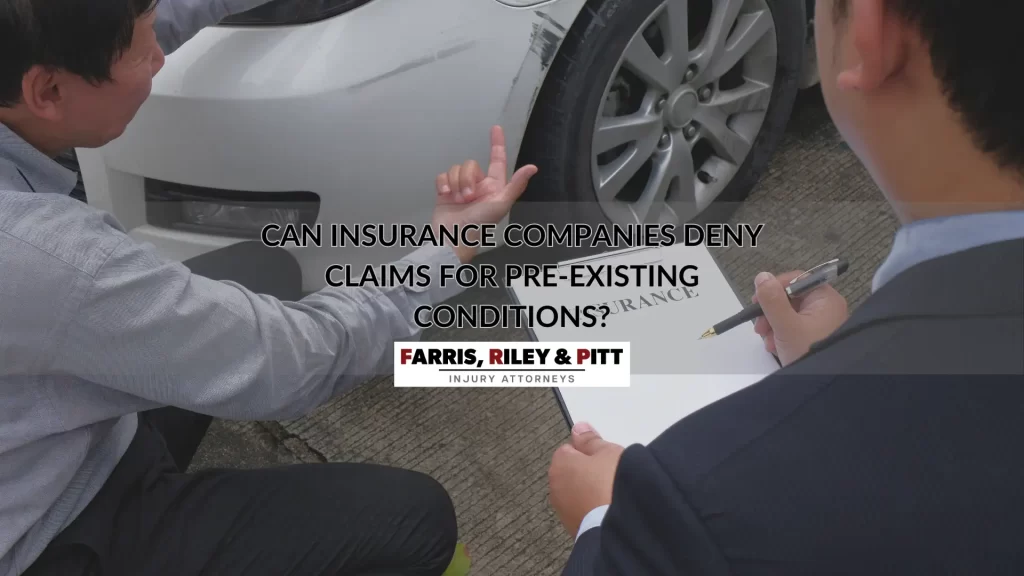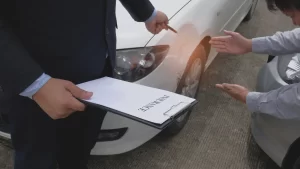Posted on Wednesday, February 1st, 2023 at 10:22 am

Getting hurt in an accident disrupts your life. You must alter your usual schedule to include doctor’s appointments. If you can’t return to work, the financial consequences can be severe. Dealing with the lingering effects of an injury, both financial and physical, is overwhelming and can be additionally frustrating if the accident was caused by another’s wrongdoing.
Holding someone else accountable for an accident and seeking compensation from them is more complicated when you have a pre-existing condition. The insurance company might deny your claim and argue that your injury isn’t new. However, when an accident occurs, it could worsen some conditions or trigger new symptoms. You might be entitled to compensation under those circumstances.
Here you will learn about pre-existing conditions, handling an injury claim, and what to do if the insurance company refuses to pay.
What Is a Pre-Existing Condition?
A pre-existing condition is a physical or mental condition that exists before an accident occurs. The condition can be a physical injury, disease, or mental impairment.
As an example: suppose you had a back injury you sustained during a car accident. The force of the impact of the collision damaged the spinal cord requiring physical therapy to regain range of motion and movement. That’s the pre-existing condition. Two years later, a fall at a restaurant damages the spinal cord and aggravates the previous back injury, making symptoms occur that had been non-existent since treatment ended after the earlier accident.
Although the injury isn’t new, the newly recurring symptoms result from a different accident – the slip and fall accident. The insurance company might deny the claim, but the injured party should recover compensation if the restaurant owner is at fault for the fall.
Do I Deserve Compensation for My Pre-Existing Injury?
No. You won’t receive compensation for a pre-existing injury after the most recent accident. You are only entitled to financial recovery for an injury caused by someone else’s misconduct. The insurance company won’t also pay for the medical care you need to continue treating a prior injury from a past accident.
However, you can hold someone liable for new injuries or for aggravating a past injury. Getting compensation for the aggravation of a pre-existing condition requires proving your current symptoms are different from or worse than those you had prior to the new accident.
Can I Seek Compensation if an Accident Affects My Pre-Existing Condition?
A previous injury or illness might worsen after an accident. Although you can’t seek compensation for the pre-existing condition, you can hold the negligent party accountable for causing an accident that aggravates a past injury.
The “eggshell plaintiff rule” allows accident victims to recover financial awards for aggravated conditions if they:
- Have a stable pre-existing injury, ailment, or medical issue when the accident occurs; and
- Don’t have a reason to believe the condition would worsen.
How to Deal with the Insurance Company That Considers Your Injury a Pre-Existing Condition
 The most important aspect of an insurance claim is remembering that the insurance adjuster isn’t on your side. They don’t want to pay you. Instead, they aim to find valid evidence to deny your claim or reduce its value to save money. Using your pre-existing condition against you is beneficial for them because they can argue their policyholder didn’t cause your injury.
The most important aspect of an insurance claim is remembering that the insurance adjuster isn’t on your side. They don’t want to pay you. Instead, they aim to find valid evidence to deny your claim or reduce its value to save money. Using your pre-existing condition against you is beneficial for them because they can argue their policyholder didn’t cause your injury.
You can fight the insurance company if you receive a denial letter or an insignificant settlement offer. Submitting evidence proving you have a new or aggravated injury is crucial. The evidence can include:
- Doctor’s statement – You can ask your physician to provide a written statement. The statement should include your diagnosis, symptoms, and treatment plan. It should also explicitly mention that your injury isn’t due to a pre-existing condition. Your doctor should describe how the injury occurred in the accident involved in the claim or how your condition was worsened by the accident.
- Medical history – Your medical history can also be valuable evidence. Send the insurer documentation related to your health during a specific timeframe. The adjuster can review your records for previous injuries to learn about the treatment you sought, whether you recovered, and ongoing issues you might have. They can’t deny your claim for a pre-existing condition if your medical history doesn’t link your most recent injury to a past condition.
- Medical records – Your medical records are the strongest tool at your disposal. You should provide copies so the insurance adjuster can review the doctor’s initial diagnosis and notes from the appointments you attend.
Get Help Fighting the Insurance Company
Handling an injury claim can be an uphill battle if you have a pre-existing condition. You must contend with the adjuster’s one-sided interpretations of your injury and arguments over whether they should accept liability for their policyholder’s actions. Convincing them that your injury is an aggravation of that prior condition and deserves compensation will be challenging
Farris, Riley & Pitt, LLP is ready to protect your rights and pursue the full and fair compensation owed to you. You can count on us to remain by your side until the end. Call us at (205) 324-1212 for a free consultation with a Birmingham personal injury lawyer if you got hurt in an accident someone else caused.















